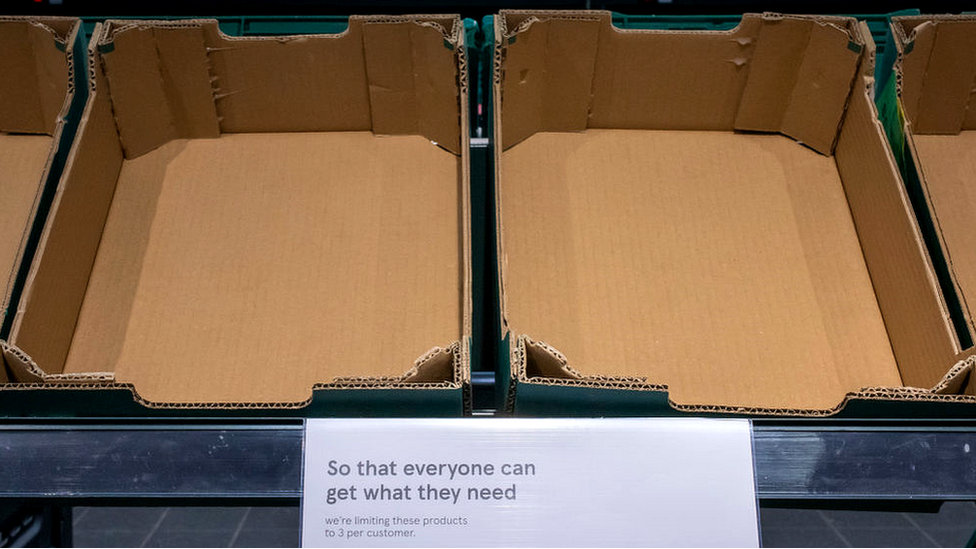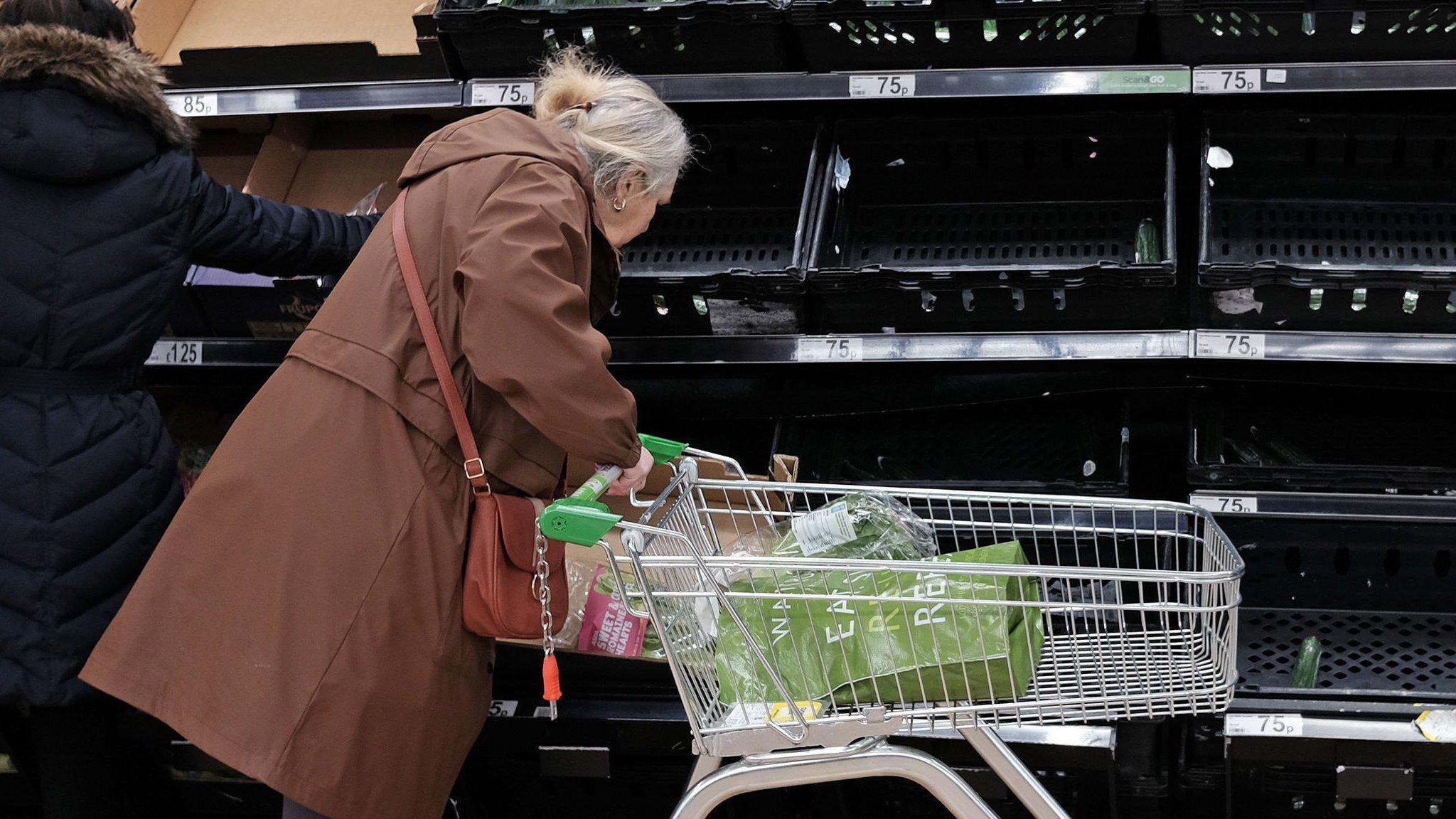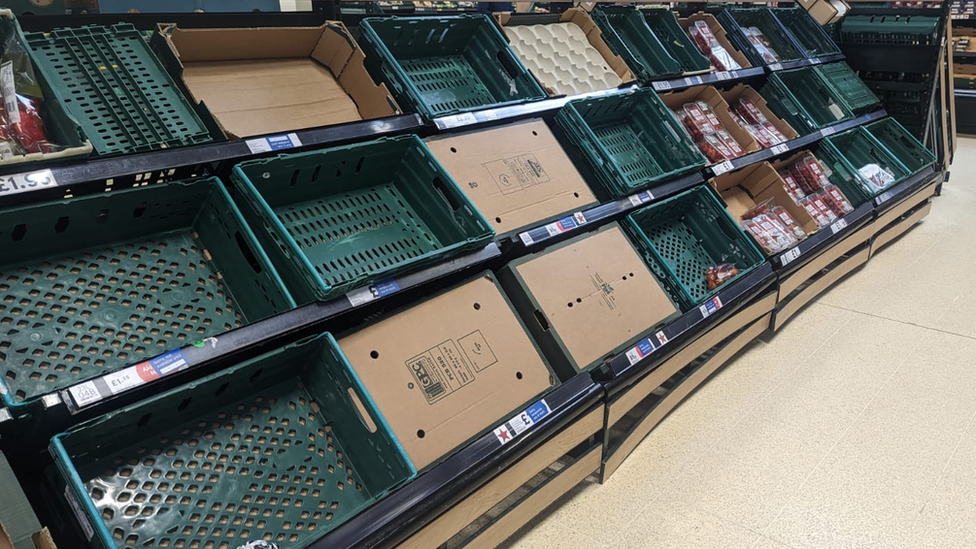Lidl limits sales of tomatoes, cucumbers and peppers
- Published

Lidl is the latest supermarket to introduce limits on sales of certain fruit and vegetables due to shortages of fresh produce.
The company is putting limits of three per customer on sales of peppers, tomatoes and cucumbers, due to "a recent increase in demand".
It follows similar moves by Tesco, Aldi, Asda and Morrisons, with some consumers facing empty shelves.
Supermarkets are facing problems after extreme weather hit harvests abroad.
A Lidl spokesperson told the BBC that "adverse weather conditions in Spain and Morocco" had impacted the availability of certain salad items.
"Whilst we still have good availability across the majority of our stores, due to a recent increase in demand we have taken the decision to temporarily limit the purchase of peppers, tomatoes and cucumbers to three items per person," said Lidl. "This will help to ensure that all of our customers have access to the products they need."
Sainsbury's, Co-op, M&S and Waitrose have not announced any limits.
Food and farming minister Mark Spencer held a video meeting with representatives from UK supermarkets on Monday, aimed at finding out what supermarkets were doing to "get shelves stocked again" and how the UK can avoid a repeat of the current situation.
Mr Spencer said he had asked retailers to "look again" at how they work with farmers to "further build preparedness for these unexpected incidents".
He had earlier blamed "recent poor weather in North Africa" for the problems.
While the majority of food sold in supermarkets comes from the UK, imported food plays a "key role" in maintaining the supply of affordable food for UK households, said Andrew Opie, director of food and sustainability at the British Retail Consortium.
He said that customers should start to see "an improvement" in the coming weeks.
Mr Spencer said that overall the UK food supply chain was resilient.
But most other European countries appear to be less affected.
Pictures on social media have shown supermarket shelves across continental Europe still full with fresh produce.
It has led to speculation that Brexit could be the reason why the UK is bearing the brunt of the shortages.
Wholesalers, importers and retailers that the BBC has spoken to suggested the picture is nuanced, with the UK facing specific issues. For instance, it has lower domestic production and more complex supply chains.
But others have pointed out that even if Brexit is not the main reason for the problems, it won't have helped.
Ksenija Simovic, a senior policy adviser at Copa-Cogeca, a group which represents farmers and farming co-operatives in the EU, said that when shortages occur, then it makes sense that whatever produce is available is more likely to stay within the Single Market.
There have been reports of some Dutch supermarkets limiting sales of certain vegetables and big price increases for some items.
A spokesman from the CBL trade association in the Netherlands, told the BBC that the cold weather in northern Spain and other parts of southern Europe had resulted in price rises for some fruit and vegetables, although they were unable to confirm whether there were any limits being imposed on sales.
But he said that there was no panic.
How long will the shortages last?
On Sunday, former environment secretary George Eustice said the shortages would last for "three to four weeks".
But producers have warned they could go on for longer.
The Lea Valley Growers Association (LVGA), which has members across Greater London, Hertfordshire and Essex, said growers had delayed planting crops this season because of soaring energy prices, as well as low prices that supermarkets had offered for their produce.
Lee Stiles, secretary of the LVGA, said: "The majority of tomatoes, peppers and aubergines are not going to be around in big volumes until May, so it's going to be longer than a few weeks."
Related topics
- Published26 February 2023

- Published22 February 2023
